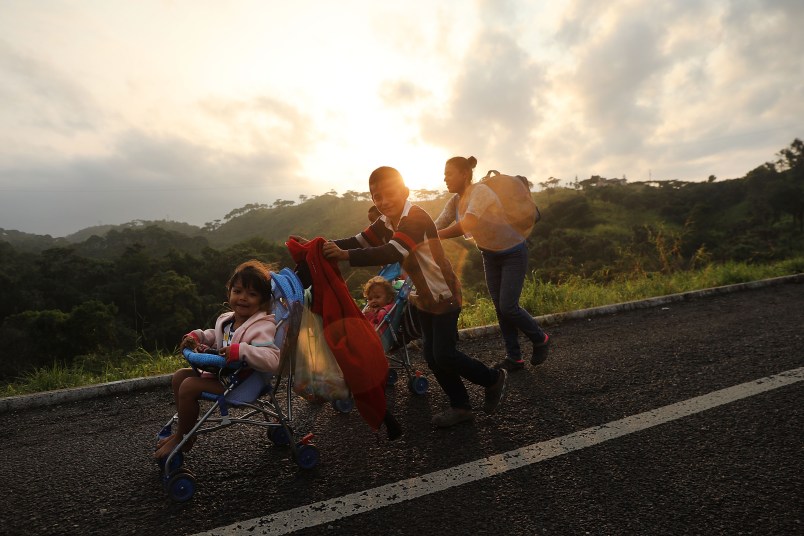DONAJI, Mexico (AP) — As President Donald Trump ramped up his anti-migrant rhetoric ahead of Tuesday’s midterm elections, exhausted Central Americans walking across Mexico in hopes of reaching the United States said they were mostly perplexed and turned off by his threats, which they perceive as exaggerated.
The U.S. president has spent the final days of the campaign hammering the issue as he tries to energize Republican voters, and his favorite target has been the migrant caravan of almost 4,000 people that is still more than 800 miles away from the nearest U.S. border. Three smaller ones are following behind it.
Trump’s recent statements include that he plans to sign an order that could lead to the detention of migrants crossing the southern border, and barring anyone caught crossing illegally from claiming asylum. Both propositions are legally dubious. Trump also said he had told the U.S. military mobilizing at the southwest border that if U.S. troops face rock-throwing migrants, they should react as though the rocks were “rifles.”
“It is pure ignorance for him to think like that,” said Marta Cuellos, a 40-year-old from Tegucigalpa, the Honduran capital. “A rock is not the same as a rifle.”
While some migrants have clashed with Mexican police at a bridge on the Guatemala border, most of those traveling with the caravans have been peaceful and say they are fleeing violence and poverty at home. Those traveling through the southern state of Oaxaca on Friday said they are not looking for trouble.
Cuellos said she owned a cantina back home in Honduras but left because she could no longer make rent and was being harassed by police. She persuaded her 35-year-old sister to join her on the trip, and said the only thing they want is work and a better life in the United States. It’s her second attempt. She first crossed into the U.S. seven years ago but was deported last year.
Selvin Maldonado, a 25-year-old from Copan, Honduras, said he left his wife and baby daughter at home in search of a better living to support his children. He took his 5-year-old son, Dennys, with him.
“What Trump said is stupid,” Maldonado said while walking to the town of Donaji. “I don’t want to attack police, because my concern is my son.”
The migrants also were also turned off by the U.S. president’s characterization of the slow-moving caravan and the three smaller ones following as “invasion.” Trump has proposed detaining migrants in massive tent cities at the border.
“We are not killers,” said Stephany Lopez, a 21-year-old Salvadoran with the first caravan. “We just want to work for a few years, and after that he can deport us if he wants.”
Lopez noted that the president’s mother, who was born in Scotland, was an immigrant.
“He should think of us as equals. Immigrants have built that country,” she said.
In June, U.S. Attorney General Jeff Sessions said that domestic and gang violence would generally no longer be accepted as reasons for migrants to be granted asylum. Trump has said this week that those in the caravan would not get asylum — though U.S. law allows them the right to apply — and warned them to turn around.
The Trump administration’s vehement opposition and tough rhetoric has at least some in the caravan weighing alternatives.
Tifany Morandis, 19, was traveling with her husband, 28-year-old Javier Sanchez, and their two sons, 7-year-old Angel and 9-month-old Cesar. Her nose and face sun-scorched after many days on the road, she said she was very tired and is considering stopping in Tijuana, the Mexican border city across from San Diego.
“Donald Trump has made things very complicated at the border, and better that we stay in Tijuana than fight with him,” Morandis said.
But many are hopeful. “Even stones can soften,” Cuellos said.







Nov 7 is coming soon, hang in there.
Then you won’t even have to consider what the moron in chief says.
In fact we probably won’t even hear about the “invasion” once trump is slam dunked into a lame duck preznit under indictment.
good news coming shortly.
For all of us that are not trump programmed into fools.
Here is a caravan of people traveling together to protect and help each other as they seek for new opportunities.
No distance or hardship can keep a decent person from noticing.
If only Donnie had the courage to go to Mexico and meet some of the people in the caravan to see who they really are. But, oh no, he’ll just use stereotypes and ramp up anger against something he knows absolutely nothing about.
The things they had to worry about was indians and like minded white trumpets robbing them.
But they made it eventually.